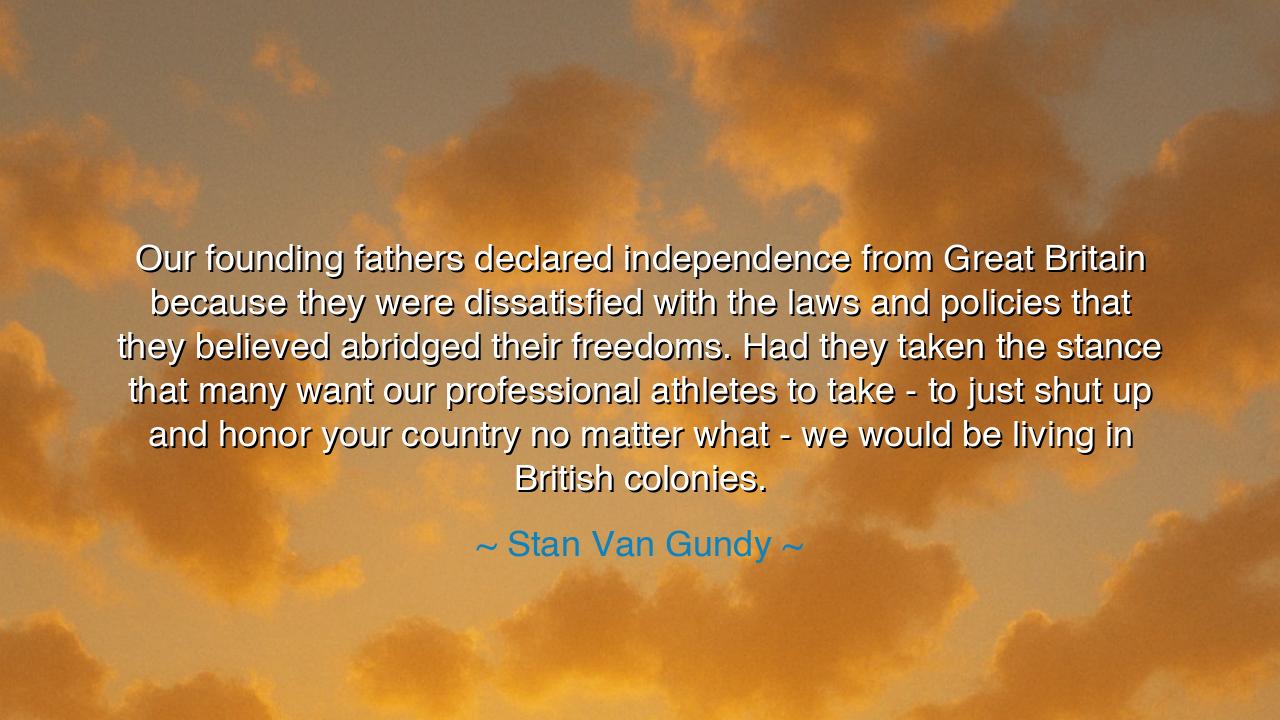
Our founding fathers declared independence from Great Britain
Our founding fathers declared independence from Great Britain because they were dissatisfied with the laws and policies that they believed abridged their freedoms. Had they taken the stance that many want our professional athletes to take - to just shut up and honor your country no matter what - we would be living in British colonies.






The words of Stan Van Gundy, when he proclaimed, “Our founding fathers declared independence from Great Britain because they were dissatisfied with the laws and policies that they believed abridged their freedoms. Had they taken the stance that many want our professional athletes to take — to just shut up and honor your country no matter what — we would be living in British colonies,” burn with the spirit of truth and rebellion. They are not the words of defiance alone, but of remembrance — a call to remember that freedom, the very soul of the nation, was born not from silence, but from courage. In these lines lies the heartbeat of democracy itself: that loyalty to one’s country does not mean obedience to its flaws, but devotion to its ideals.
For Van Gundy speaks as one who understands that the Founding Fathers were not saints draped in myth, but men of fire and conscience — rebels against tyranny. They stood before the greatest empire of their age, and they dared to speak what others feared to whisper. Their cry of independence was not a rejection of country, but an act of love for liberty. They saw that to “honor your country” truly, one must have the courage to confront its injustices. They did not “shut up” in the face of unfair laws; they raised their voices until those laws were broken and remade. It was in their refusal to be silent that the United States of America was born.
So when Van Gundy speaks of modern voices — of athletes and citizens alike — he draws a sacred parallel across time. He reminds us that protest is not an act of betrayal, but the truest expression of freedom. To kneel, to speak, to question — these are the rights for which the founders themselves risked their lives. If those same men had bowed their heads to authority, if they had chosen comfort over conscience, the dream of liberty would have died before it was born. Thus, his words pierce through the noise of modern hypocrisy, calling upon all who love their nation to remember that dissent is not disloyalty — it is devotion in its most courageous form.
Consider, for a moment, Frederick Douglass, born into bondage, who rose to become one of America’s greatest voices of conscience. On a day when others celebrated independence, he stood before them and asked, “What, to the American slave, is your Fourth of July?” His words were not meant to dishonor the nation, but to awaken it — to hold up a mirror to its promise and its failure. Like the Founders, he refused silence in the face of injustice. His speech, though painful, was patriotic in the truest sense — for he believed that the nation could rise to meet its ideals only if it had the courage to hear the truth about itself. Douglass, too, would not “just shut up and honor” his country blindly; he honored it by demanding that it live up to its creed.
The same spirit flows through every age. It was there in the women who marched for suffrage, defying ridicule and imprisonment to claim their voices. It was there in the civil rights leaders who faced clubs and fire hoses to demand equality under the law. It is there still, when athletes kneel or speak out — when they use the platforms their labor and talent have earned to remind the powerful that justice is unfinished work. This, Van Gundy reminds us, is not disrespect. It is the continuation of the same independent spirit that broke the chains of empire and built a nation upon the daring belief that “all men are created equal.”
And yet, his words are also a warning. When a people begin to silence their conscience in the name of comfort — when they begin to believe that patriotism means obedience — the soul of the nation begins to decay. The founders themselves were once called ungrateful, treasonous, and unpatriotic by those who preferred peace to principle. But history has a cruel memory: it honors the voices of the brave and forgets the silence of the compliant. The lesson, therefore, is eternal — that love of country is proven not in quiet submission, but in the courage to speak truth when silence would be easier.
So, O listener, take this teaching to heart: freedom is not inherited like wealth, nor preserved by ceremony. It must be renewed by every generation that dares to question, to challenge, and to demand better. When you see injustice, do not turn away; when you hear falsehood paraded as loyalty, do not be deceived. The founders did not kneel before kings, and neither should you kneel before the false god of complacency. To honor your country, you must help it grow — even when growth requires pain.
Thus, the wisdom of Stan Van Gundy’s words becomes a torch for our time: that independence is not an event of the past, but a living duty of the present. The right to speak, to protest, to strive for a more perfect union — these are not acts of rebellion against America, but acts of faith in her promise. For a nation that silences its critics is no different from the empire it once overthrew. Therefore, stand tall, speak with integrity, and remember always that freedom’s greatest defender is the voice that refuses to be silent.






AAdministratorAdministrator
Welcome, honored guests. Please leave a comment, we will respond soon